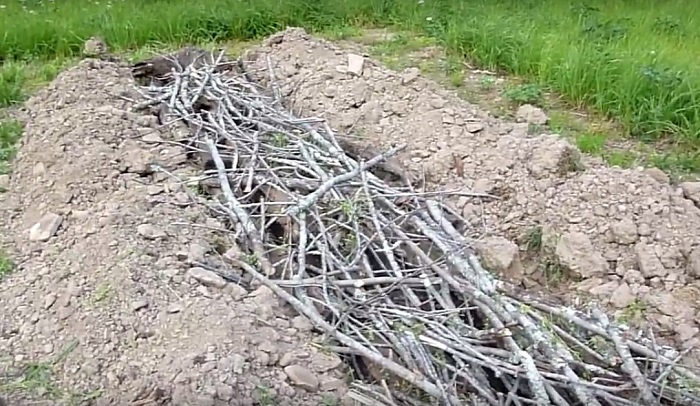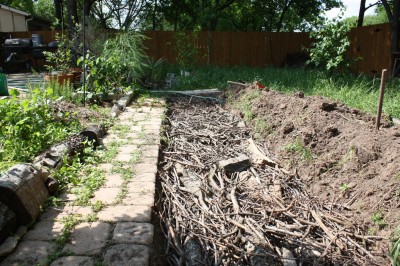
Hugelkultur, the German word for “hill culture,” is the ideal method for the farmer/grower looking for a unique and practical way to grow a weed-free and healthy garden. This method of planting has been used for centuries in Germany and Eastern Europe and allows for greater biodiversity, moisture-control, convenient harvesting, less maintenance, and saves the need to till.
Conventional farmers may have a really hard time with this growing method because they know rotting wood steals nitrogen until it’s fully decomposed (when it then releases it back to the soil). Well, this is a bit different. The wood itself will slowly decompose; meanwhile, it becomes a hotel for beneficial microbes and amazing fungi.
Microbes are not only extremely important, but they also are extremely interesting little organisms! They can help roots acquire nutrients, such as phosphate. Some microbes can even kill Salmonella, making your food safer. Microbes also help protect plants from the nasty wars going on in your soil. A hugelkultur garden houses all of these microbes, furnishing them with everything they need to be healthy and strong.
Get The Best Deals On Non-GMO Seeds For Your Garden Right Here!
Right up there with microbes, fungi does wonders for the garden! Fungi gives us a natural way to break down organic matter like the wood in a hugel (short for hugelkultur). All that buried wood would otherwise take years to break down, and do so very slowly. Fungi will break down the wood faster and release the nutrients at a much quicker pace in order to make the plants healthier.
The wood in the hugel will become warm from the slow-composting action. Since soil covers the pile of wood, the composting wood will not overheat. Conveniently, this action maintains a warm temperature over the winter months.
Story continues below video
https://www.youtube.com/watch?v=iHEioJeeWxA
In a test of ability, we performed a small experiment with goji berry plants using a hugel versus a standard bed. The goji berry plants on our hugel produced several more harvests across several weeks compared to goji berry plants growing out of a standard bed.

Hugel beds are also fantastic for preserving moisture for a sort of self-watering system. The buried wood receives most of the credit for this action in that it holds the water. This water then feeds the bacteria, fungi, plants and other helpful organisms. Moisture is essential for life in all types of gardens. Hugel beds will hold all the water they need, and you don’t need to water them if built correctly. Many people using hugelkultur employ a swale. A swale is basically a tactic to catch water and hold it at the hugel bed. This can be as simple as a U-shaped bed pointing up your property’s grade. When rain falls, it will run into the U-shape, effectively trapping much of the water. This is not needed, but it helps. I did have a swale in my bed but removed it for space reasons.
This New All-Natural Fertilizer Doubles Garden Production!
Are you ready to build your hugel bed?
Building the Hugel Bed
- Make a trench if you find it convenient; it will help hold water.
- Insert logs (most efficient if you cut the larger logs into sections and face them up like stumps in the ground) or lay them flat.
- Pack in all the open spaces with branches and twigs.
- Add some wood chips if you would like.
- Cover with a minimum of 8 inches of soil.
Digging a trench will also give you some soil to cover the hugel. It saves the time and energy of finding soil without making a huge hole in the lawn. It also may be a good idea to add aged manure directly over the wood before covering. There are so many variations you can do to suit your needs. Some people also inoculate the ends of the bed with mushroom mycelium and then harvest mushrooms from the hugel bed.
Some plants will like your hugel more than others. We had really good success with tomatoes, strawberries, goji berries, cucumbers and beans. The longer you have your hugel, the better the harvest will be. So give it a shot, and you won’t regret it!
Have you ever used a hugel bed? Share your advice in the section below:
Don’t Make The Same Mistake Other Gardeners Make Every Year. Read More Here.











